Digital Sciences for Society event brings together a variety of disciplines
How can we use technology to contribute to global security and prevent it from compromising our global order? Will ChatGPT lead to more in-class teaching and examination? What are the opportunities and obstacles to using data for accelerating the transition to a sustainable and future-proof energy supply? These questions and more were discussed at the Digital Sciences for Society event.
The event on 7 November in MindLabs was a joint initiative of Tilburg University’s Digital Sciences for Society program and the Tilburg University AI Special Interest Group (TAISIG). It attracted over a hundred attendees, mostly scientists, but also other Tilburg University staff and external societal partners. The various Tilburg University Schools were represented both among speakers and participants.
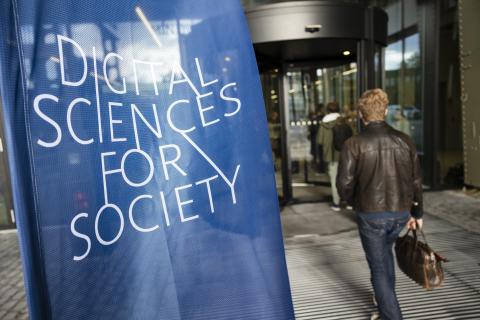
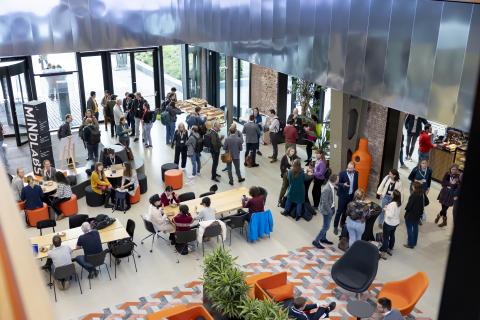
Digital Sciences for Society changes the notion of social sciences for the better
“Digital Sciences for Society will change and challenge the notion of social sciences for the better,” says Rector Magnificus Wim van de Donk in his opening of the plenary part. “We will never discuss social sciences anymore without considering the digital sciences.” Van de Donk emphasizes that Tilburg University was one of the first universities to acknowledge that digitalization brings fundamental changes and that understanding society cannot be done without understanding technology. He invites everyone to reach out to colleagues in other Schools and to invest in projects that call upon the best of all disciplines.
Digital Sciences for Society will change and challenge the notion of social sciences for the better
Wim van de Donk
After being complimented by Wim van de Donk for his leadership role in the Digital Sciences for Society program, Boudewijn Haverkort takes the floor, expressing how happy he is to see so many present here, and how proud he is of what has already been achieved. It cannot be a coincidence that the recently published national Knowledge and Innovation Agenda on Digitalization states that we should invest in innovation with, innovation in, and reflection on digital information technologies. This corresponds exactly with three lines of our Digital Sciences for Society program: “This Knowledge and Innovation Agenda will offer opportunities for additional research funding, for example for projects around which consortia have already been formed.”
This Knowledge and Innovation Agenda will offer opportunities for additional research funding, for example for projects around which consortia have already been formed
Boudewijn Haverkort
Boudewijn continues that besides research, the Digital Sciences for Society program also addresses education and community building. TAISIG, our partner in today’s event, is one of the communities the program is supporting. The program is open to supporting other communities as well, such as around the topic of digital twins, Boudewijn adds. In the field of education, steps are being taken to develop a Digital Sciences curriculum within the Bachelor's programs and a Digital Sciences minor open to all Bachelor’s students.
Technological power one of the biggest forces shaping our global order
In his plenary keynote presentation ‘Security in the age of AI’, Roy Lindelauf, Endowed Professor of Data Science, Safety & Security, updates the audience on developments in AI in the context of safety and security. He opens by saying that technological and digital power are now considered to be among the most powerful forces in shaping our global order besides military and economic power.
Combining his professorship with a position at the Faculty of Military Sciences of the Netherlands Defense Academy, he effortlessly links theory to cases of military practice. Not only did AI help the US to predict the Russian invasion of Ukraine, it also has the potential to detect and intercept attacks on essential communication infrastructure. For AI to be trusted as a decision-making support tool, AI must be explainable, and Roy argues that it needs to be explainable in a way that is not only understood by data scientists and AI specialists, but also by other experts. This feature, such as knowing what concepts an AI model bases its conclusion on, is also important for detecting biases.
Ecosystems such as MindLabs with scientists working with industry are very important in that respect
Roy Lindelauf
Roy concludes by saying that the solution to mitigating risks posed by technology should not only be sought in legal frameworks, but also in technological innovations. “This requires leadership at the highest levels of both academia and policy,” he insists. He advocates working together on solutions, combining a technical perspective and a policy perspective. “Ecosystems such as MindLabs with scientists working with industry are very important in that respect.”
Should we always look for a technological solution?
For the brief time left for discussion, moderator Pieter Spronck asks three panelists what they think are the major opportunities digitalization offers and what the biggest threats.
Merel Noorman, expert in the governance and regulation of AI, sees great potential for healthcare, security, and other areas, as well as for solving efficiency problems. But she thinks digitalization can also create new efficiency problems. Therefore, she recommends not only discussing ‘Should we do it this or that way?’ but also ‘Should we look for a technological solution?’
Marijn van Wingerden sees a lot of potential for healthcare data analysis, a field in which he is active as a data scientist, but there is a major privacy issue: “The challenge is to try to navigate this landscape, benefiting from the large amounts of data collected while at the same time respecting privacy.”
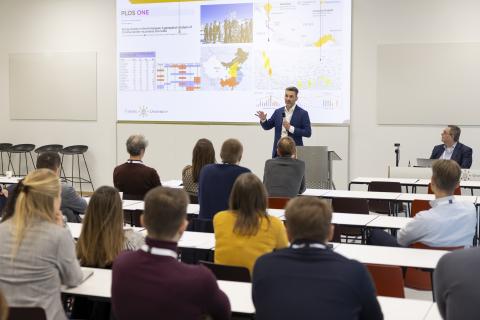
Roy Lindelauf emphasizes the opportunities AI offers for analyzing visual data, because it is much more efficient than the human eye. He recognizes there’s a downside to the desire for data to be open source: it facilitates drone attacks, the creation of deepfakes, and so on.
A recording of the opening speeches and keynote presentation by Roy Lindelauf can be viewed via this link.
Breakout sessions
After the plenary parts of the program, participants were able to attend several breakout sessions divided over two rounds. Below you can find the highlights of some of these sessions.
Collaboration for Impact
By Remco Mannak, Mignon Wuestman and Bregje Swinkels
Collaboration and impact go hand in hand. From earlier research on R&D consortia, we know that it is important to think about what makes your potential partners want to join a project, how they can contribute, and what the potential outcomes of the project may be. In four groups, potential partners of four different Digital Sciences for Society projects were discussed, considering what their role within the consortium may be in different phases of the project.
Each of the four groups mentioned at least one new insight. One group realized they have to consider how to involve implementation partners in their consortium. In another group, members offered to introduce each other to partners in their own networks.
Anyone who would like to know more about how collaboration in research can contribute to societal impact, can reach out to Mignon Wuestman or Bregje Swinkels of Tilburg University’s Knowledge Transfer Office.
Digital Sciences and the energy transition
By Wendy van der Valk, Tom Aben and Mertijn Weeda
Wendy van der Valk opened by explaining that Digitalization & Data is one of three key themes of the Academic Collaborative Center on Climate and Energy in which she is involved as one of the academic leads. The center involves Tilburg University researchers from disciplines across Schools who work closely together with societal partners to co-create knowledge and impact. On the topic of Digitalization & Data the Center works closely together with Avans University of applied sciences.
- Postdoctoral researcher Tom Aben gave a short presentation about the VIA AUGUSTA project he is involved in, which is about organizing the sharing of data in interorganizational relationships to support the energy transition. In the presentation, Tom addressed several challenges, such as data not being used that much yet, organizations largely working reactively, different stakeholders having conflicting goals, information asymmetries, laws preventing the sharing of data, information systems of different suppliers not matching, et cetera. The importance of governance of interorganizational relationships was stressed, including both contractual governance and relationship governance revolving around transparency, trust, and setting common goals. Becoming smarter is not simply introducing digital technologies, it requires interorganizational collaboration because organizations cannot operate in isolation.
- Mertijn Weeda, Researcher Smart Energy at Avans University of applied sciences, gave a short presentation about the use of data to support business models. He explains how Avans uses its Smart Energy Delivery (SEnD) Lab for simulating whole energy grids, allowing them to measure performance under specific circumstances. Algorithms are created and tested to control energy, share energy, make buildings smart, et cetera. The lab also allows for simulating energy use in a home or a whole neighborhood. Energy storage options can be included and algorithms can also be tested on those. Mertijn stressed that using digitalization to advance the energy transition also requires social, economic, and legal expertise. That is one of the reasons why Avans has become a partner in the Academic Collaborative Center on Climate and Energy.
Wendy van der Valk concluded by inviting anyone with relevant research expertise to join the Academic Collaborative Center on Climate and Energy. Researchers are welcome to bring their own network, share insights, and help identify research opportunities.
How do we make the city more livable with an Urban Digital Twin?
By Nick van Apeldoorn
Topic of this sessions was research on the perceptions of urban digital twins and the questions what needs they might be able to fulfil and what cases are relevant for the future.
A lively discussion took place on the digital capabilities of the users, the grey area around the factuality of information and the importance of making these tools more accessible.
Anyone who would like to know more can contact Nick van Apeldoorn (Apeldoorn.N@buas.nl). He can share the publication behind the presentation. Nick also makes an open invitation to bring these cases into practice in the Digital Europe Call: Data Space for Smart and Sustainable Cities and Communities.
The (im)possibilities of ChatGPT for education
By Alexander Schouten
How do students use ChatGPT? What are ChatGPT’s strengths, and what its weaknesses? Should we encourage or discourage its use? These were among the questions discussed during this session.
In the audience there were lecturers and some students. Strengths of ChatGPT that are mentioned are that it can aid the thinking process. For example, it can be instructed to criticize ideas, present other points of views, et cetera. It can create content and optimize content by adjusting style to tailor a text for a specific public. It can make data analyses and data visualizations, is a good help in learning to master a new language by providing a relevant word list and generating tests. It is also a good translation tool.
Some weaknesses of ChatGPT mentioned are that it does not know right from wrong, that it is trained using data from the Internet (not necessarily the best data out there), and that it cannot explain where and how it came by information. There are also security and privacy issues, as well as ethical issues concerning information bias, the use of copyrighted information for training, output responsibility, environmental impact, and more.
It is hard to detect whether a person has used it, which is one of the reasons why it has so much impact on education. Some indicators are that ChatGPT output is often quite generic and contains vague quantifiers: it lacks specificity. Also, some students suddenly show a huge improvement in their use of English, or are not consistent in their style of writing.
Should we encourage or discourage the use of ChatGPT? One lecturer believes it is crucial to test students in an environment where they do not have access to ChatGPT but thinks it can be used in education. Another says it can help students but it can be harmful if they do not use it in the right way. Another participant thinks students should be taught to be transparent about their use of ChatGPT, much in the same way they are taught to be transparent when doing research. Another participant wonders how students will develop critical thinking and fundamental skills if they start to rely too much on ChatGPT? To acquire those skills they need to practice but ChatGPT gives them ‘answers’ straightaway. That way students do not acquire these skills. Another participant suggested that students mostly come to university because they want to learn.
Alexander Schouten concludes his presentation with the following tips and suggestions:
For the short term:
- Try out ChatGPT
- Discuss the vision of generative AI in teaching within your department
- Implement quick wins in your teaching
- Develop rules and procedures
- Accept change! This is a disruptive moment
For the longer term:
- Integrate the use of generative AI as a skill in the teaching program
- Less examination, more teaching
- More digital examination facilities
- More in-class assessment and campus examinations
Alexander also refers to the following page of Surf with interesting articles about the use of AI in education (in Dutch): https://communities.surf.nl/ai-in-education/artikel/chatgpt-verzameling-bronnen
Presentation Icon and Growth Projects: Digital Sciences for Society research
Çiçek Güven & Valentina Sanchez Melchor who are involved in the Icon project From impoverished to enriched brains gave a presentation exploring the intersection of Graph Neural Networks (GNNs), poverty, and cognitive development, emphasizing the potential of GNNs to model the impact of poverty on brain structure and function across the lifespan. It showcased a multidisciplinary approach, combining neuroscience, data science, and ethics to address how socioeconomic factors affect cognitive processes and brain networks, using large-scale neuroimaging datasets like the UK Biobank, PING, and ABCD.
The presentation gave insights into how GNNs can be extended to capture longitudinal changes in brain development affected by poverty. Also the need for explainable AI was identified to make neural network decisions transparent, especially in the context of socioeconomic data. Proposals were done for multi-modal data integration to better understand the neural mechanisms underlying poverty’s impact on cognition.
The speakers appeal to the attendees and those reading about the session to consider the ethical implications of AI in socioeconomic research and explore opportunities for collaboration in this cross-disciplinary field to further these insights. Moreover, they invite anyone wanting to dig deeper to seek direct contact with the research teams and institutions involved, such as the Zero Poverty Lab.
Ini Vanwesenbeeck presented the Growth project Filtering Reality in which she is involved, explaining that although young adolescents are aware that social media presents an idealized picture, they still experience negative effects on their body satisfaction and body image from their intense social media usage. Through a multi-method design (survey and focus groups) the project aims to lay the foundations for a future evidence-based media literacy intervention.
During the session, the societal relevance of the topic was stressed: social media can negatively affect young people’s body image and wellbeing. Throughout the session, it became clear that this societal issue needs to be tackled through multiple stakeholders. Not only children and schools should be addressed in the intervention, but also parents, relevant organizations, and policymakers need be involved.
Ini states that addressing societal problems arising from digital technology often require a multi-disciplinary approach. Setting up initiatives and searching for partners (within and outside the university) takes time. Therefore she calls upon other researchers to already start connecting to others outside their own discipline rather than to wait for a proposed deadline, so that research ideas can already start to develop.
Other breakout sessions offered, were:
- Interactive information session on digital research support, by Puck Wildschut
- Walk-in consultation Digital research infrastructure, by the Digital Research Support team of Tilburg University
- AI and ethics: everyone is an expert?, by Merel Noorman
- Development of modern AI and impact on Society, by Pieter Spronck and Marijn van Wingerden
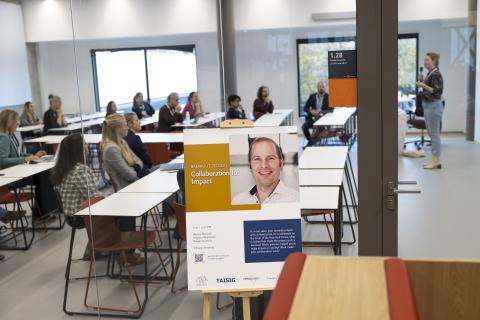
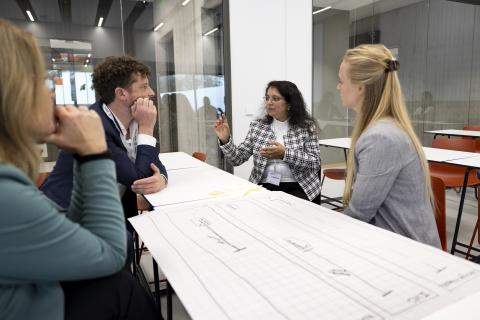
Get ready for the digital future
The Digital Sciences for Society program invests in impactful research, education and collaboration aimed at seizing the opportunities and dealing with the challenges of digitalization for science and society.
